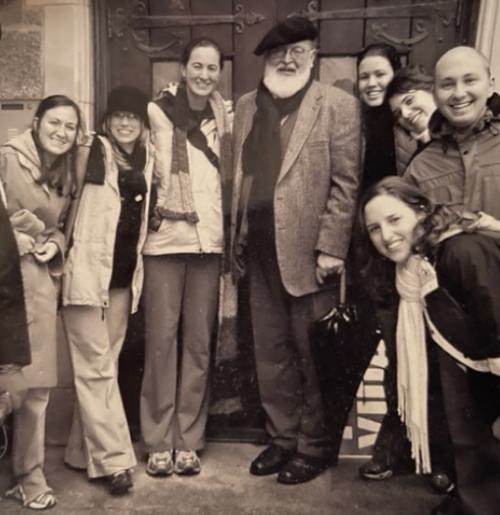November 16, 2022 marked the passing of David L. Schindler, Dean Emeritus and Edouard Cardinal Gagnon Professor Emeritus of Fundamental Theology at the John Paul II Institute in Washington, D.C. Dr. Schindler’s theological and philosophical contribution was both wide and deep. Particularly important was his trenchant critique of American liberalism, unmasking its pretentions to offer an empty political and juridical form, free of theological or metaphysical presuppositions, which individuals and private groups could ostensibly fill with whatever comprehensive view they might choose. His work exposed liberalism’s imposition of its own tacit anthropological outlook. This decades-long work on the problematic of American culture bore fruit in a profound metaphysics of the person, freedom, love, and the nature of being as gift. He worked relentlessly to “keep the world awake to God,” showing that “God and the love of God revealed in Christ through the Church must make a difference to everything, to every entity and every act, including every human cognitive and voluntary act, all the time. Nothing in the cosmos is or can be indifferent to God or indeed love, ultimately to the love of God as revealed in Jesus Christ through the Church.”
Dr. Schindler played a fundamental role in establishing Humanum: Issues in Family, Culture & Science in 2011 and continued to be a great friend of the publication in the years that followed. Notably, he set the tone for much that followed in Humanum in "'We Are Not Own': Childhood and the Integrity of the Human in a Technological Age," the feature article of our inaugural issue.
Humanum would like to pay tribute to Dr. Schindler and his work as theologian and teacher by sharing an original poem written in memory of him by Carla Galdo, a frequent contributor to Humanum and a student of Dr. Schindler.
What Then Must We Do
We hover on the cusp of what-will-be,
hunched classroom-bound, alert and questioning,
our notebooks scrawled in ink. He lectures us,
his bouncing knee beneath the desk a sign
of all that lingers here without our full
control. So what then, must we do, we ask,
young body-souls all wrangling hard
to come to grips with this incarnate world
he opens up to us. Just go back home,
he says. And love them well. And go to work
and love them all there too. But what's the shape
of this, he asks, and stops, and peers at us—
it’s always cruciform. He closes up
the curled notes on his yellow legal pad,
for class is done and we are now dismissed.
It is all gift, he says, this laden cosmos,
this space we drift in rough communion near
the center of the Church. We are mosaics
of all our joys and hopes, our griefs, and our
anxieties; we give our speckled thanks
flecked by the flames of eucharistic feasts.
Our hearts are softened, pierced; we fall in love,
then out, on D.C.’s leaf-strewn streets. He laughs,
commiserates, invites us all to read
and think and see the non-neutrality
of things (in ways that ought to be unpacked,
of course). We visit during office hours,
bask in the shadow of his brimming shelves,
still mysteries to ourselves. The Word made flesh
has brought us here, and likewise, sends us off.
So what then must we do, as we spill out,
birthed forth in groups from these arched gothic doors
into the fiat-forms our lives will take:
to wed, to bind ourselves to man or Christ,
to preach in foreign tongues. To trace the brain's
electric arc, to hold small bodies close,
to bake and herd and milk and tend the land,
to write and speak and teach and search and pray.
To lead, to stumble on in gratitude
and die each day, a bit. If Dorothy's
long loneliness could open up a way
to find the infinite in signal flares
that flashed from battered souls on pilgrimage,
then, just perhaps, his words can lash secure
the beams where we stretch out our hands each day.
Carla Galdo is a graduate of the John Paul II Institute, a leader of the national Catholic women’s book group Well-Read Mom, and a student in the Master of Fine Arts in Creative Writing at the University of St. Thomas-Houston. She lives with her husband, four sons and two daughters in Virginia.
